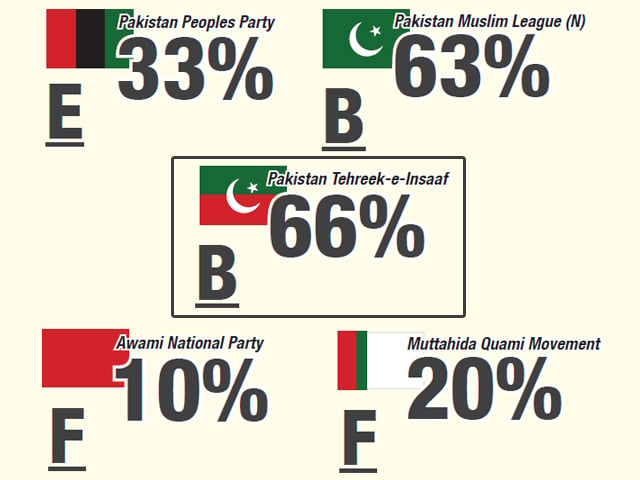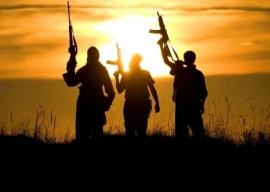
Manifestos in Pakistani elections are treated by most political parties as homework: a dreaded chore that must be done before they can be allowed to go play the electoral game they enjoy so much. The homework usually gets done, but its quality is often left unexamined, and is therefore uncertain. With just days left to the election, we at The Express Tribune have taken the liberty of grading these manifestos.
Our aim in this special report is to examine how much each political party has thought about the economy. We recognise that parties rarely fulfil all the promises they make in manifestos, or even come close. But the documents are nonetheless useful and deserve to be examined: they reflect whether or not the parties even have an understanding of the challenges they face, should they be entrusted by the voters with the responsibility of actually governing the nation.
Our focus on the economy has meant that this special report focuses not on the entirety of the manifestos, but only on their sections most closely related to the economy. Hence, for example, we omit sections on civil rights, education, and health. Each of these things has an indirect impact on the economy, particularly education, but there are other considerations to each that are not strictly economic.
We have adopted a methodology inspired in part by an analysis of manifestos done by the Pakistan Business Council, a think-tank/lobbying group. But the criteria we have used are somewhat different from those used by the PBC. Like the PBC, we emphasise energy above most other segments, believing that no government will be able to fulfil any part of its agenda unless it first confronts the now-chronic energy crisis.
Broadly speaking, we have identified four categories that we believe are most important: energy, fiscal responsibility, reducing regulatory hurdles (which includes global trade), and improving government efficiency. Within each, we have graded each party on five or six separate criteria, with each grade representing the level of detail and specificity that a party is willing to offer on any given criterion.
Our methodology is, of course, subjective and therefore open to debate and dispute on any given criterion we chose to utilise (or others that we chose not to use). Nonetheless, while the individual bits of our analysis may be debatable, our overall conclusion seems to be on par with most other analysts: the Pakistan Tehreek-e-Insaf (PTI) and Pakistan Muslim League-Nawaz (PML-N) pay the most attention to the economy, with the Pakistan Peoples Party a distant third and the other parties so far behind as to not even merit mention.
In our grading, the PTI comes out slightly ahead. But lest the Insafians get ahead of themselves, we would like to introduce a caveat: the difference with the PML-N is so minor that neither can claim definitive superiority over the other, unless the debate acquires a distinct ideological bent.

Our analysis focused only on the three major national parties and two of the most important regional ones: the Awami National Party (ANP) and the Muttahida Qaumi Movement (MQM). It is perhaps unfair to compare the regional parties to national ones, but both of these parties are particularly keen to cast themselves as national-parties-in-waiting, and so we felt comfortable including them.
The analysis, however, does not present either in a favourable light. Both ANP and MQM got bad grades on the economic segments of their manifestos. Perhaps they should pay a little more attention to their homework.
Published in The Express Tribune, May 6th, 2013.
Like Business on Facebook to stay informed and join in the conversation.
COMMENTS (19)
Comments are moderated and generally will be posted if they are on-topic and not abusive.
For more information, please see our Comments FAQ

1732274008-0/Ariana-Grande-and-Kristin-Chenoweth-(1)1732274008-0-165x106.webp)



1724249382-0/Untitled-(640-x-480-px)1724249382-0-270x192.webp)


1732270499-0/Express-Tribune-(7)1732270499-0-270x192.webp)
1732267715-0/BeFunk_§_]__-(32)1732267715-0.jpg)







@not impressed: Following is my understanding: IK's favorite states are Nordic European countries (that focus heavily on social welfare). So, when he means 'Islamic Welfare State', he is actually referring to a welfare state and Islamic just means that no new laws will be passed that are against the spirit of Islam (Ex: drinking would continue to stay banned, at least officially). As to how, the increased fiscal space created through economic reforms will be exclusively focused on education, healthcare, job creation, and empowerment of masses. Hope this helps.
can some PTI supporter explain to me what Imran Khan means when he says we will make Pakistan an "Islamic Welfare state" - how, and what does that mean?
@economist: The idea that austerity and social welfare are not economically possible at the same time is based on the assumption that governance machinery is already operating at the efficiency frontier, which is rarely true (especially in case of Pakistan). Austerity is about cost savings and PTI has explained that only 2% of additional fiscal space will come from this austerity through governance reforms and 2% can be easily saved by stopping bleeding of GSEs (contributing more than 400Bn to the national exchequer losses). As a whole, projection of PTI policy is mainly on increasing taxation levels (roughly 1%) each year to reach 15% in 5 years. This is easily doable and other economists have already commented on it. Lastly, I don’t know of any popular Pakistani economist who disagrees with this approach of raising taxes and rationalization of govt expenses to bring down fiscal deficit.
PTI will focus at overeas pakistanis who share 7% of our GDP who gave this country 13 bn dollars in 9 months. Will increase direct tax and application of tac at agriculture produce & luxuries. Now tell me what will PML N do?
@lol @ economist: Uh, you do realize that the 'economic jargon' I used is in the PTI policy paper right? Thanks for making my point for me. Sir, there is no sense in taking part in a discussion about economic policy if you are ignorant of economic matters and vernacular.
More like here is something to catch your attention. We will give a cursory explanation of our methods to make it sound legit. Cheers.
@MAD: +100 to your post. Exactly what I was going to say. I keep on repeating myself on the comments section that "please don't vote for the tried and tested failed parties". I will vote for PTI but even if you don't want to vote for them at least don't vote for the parties who have time and again failed to deliver.
Economic plans should follow the model that had been set up by Musharraf which gave Pakistan great progress and respect Internationally.
PTI has no track record so the only way to judge whether it implements its manifesto or not is to bring it to power. With PMLN having been in power and as yet never even tried to implement their manifestos we can surely judge that the same will happen this time around. PPP is quite hopeless in this regard. So my vote is for the Bat here. lets see how it goes.
@economist: and let me just use economic jargon based on no facts so that it makes me appear like i know what im talking about
PMLN thinks building roads and railway tracks reduce gas loadshedding, electrical loadshedding, and unemployment. The fact is the companies submit a high bid which is approved by the government and the money goes into the pockets of the sharifs and the builder. Don't be fooled by pmln, they just want to fill their pockets.
@Hamza Asad: Unlike the PTI manifesto which proposes to impose austerity while simultaneously creating a welfare state? I challenge any economist to make sense of that lol
PTI manifesto is more pragmatic although I feel PML-N will instill confidence in business houses and there will be more domestic investments and industrialisation.Irrespective of who comes in power, next 6 months, the country on economic front will have to make very tough choices. I hope honest and dedicated team at key positions is posted at FBR
I feel PTI manifesto is heads and shoulders above the rest as it gives a clear roadmap for real change. Its more specific on tax reform and institutional reform, its the only party talking of eradicating development funds to parliamentarians and discretionary funds apart from significantly increased focus on health and education. Also people may disagree with its policy on terror but it is by far the most comprehensive plan we have seen from any party to counter this menace.
@loving khan: PML-N manifesto is full of gimmicks
My name says it all.
What a surprise that there are no comments on the few articles that delve into the matter of each party's proposed policies! (sarcasm).
On a more serious note, it feels like we spend so much time on discussing the juicy tabloid 'he said she said' articles, that very few of us actually know what we're voting in.
Most importantly, how has the general public not called out the major political parties for elaborating their position on the IMF loan? You hear each quaid tell us that Pakistan shouldn't be a 'ghulam' to the US but I dread to think of the effects that no taking the IMF loan will have on our already weak economy.
I am not agreed on this grading that you have given weightage to PTI as PTI has no clear manifesto about economy on the other hand PML Nawaz has clear objective to grow economy.The Nation is confused that why the whole media is giving to much importance to PTI.We think it might be a Western agenda to promote PTI.